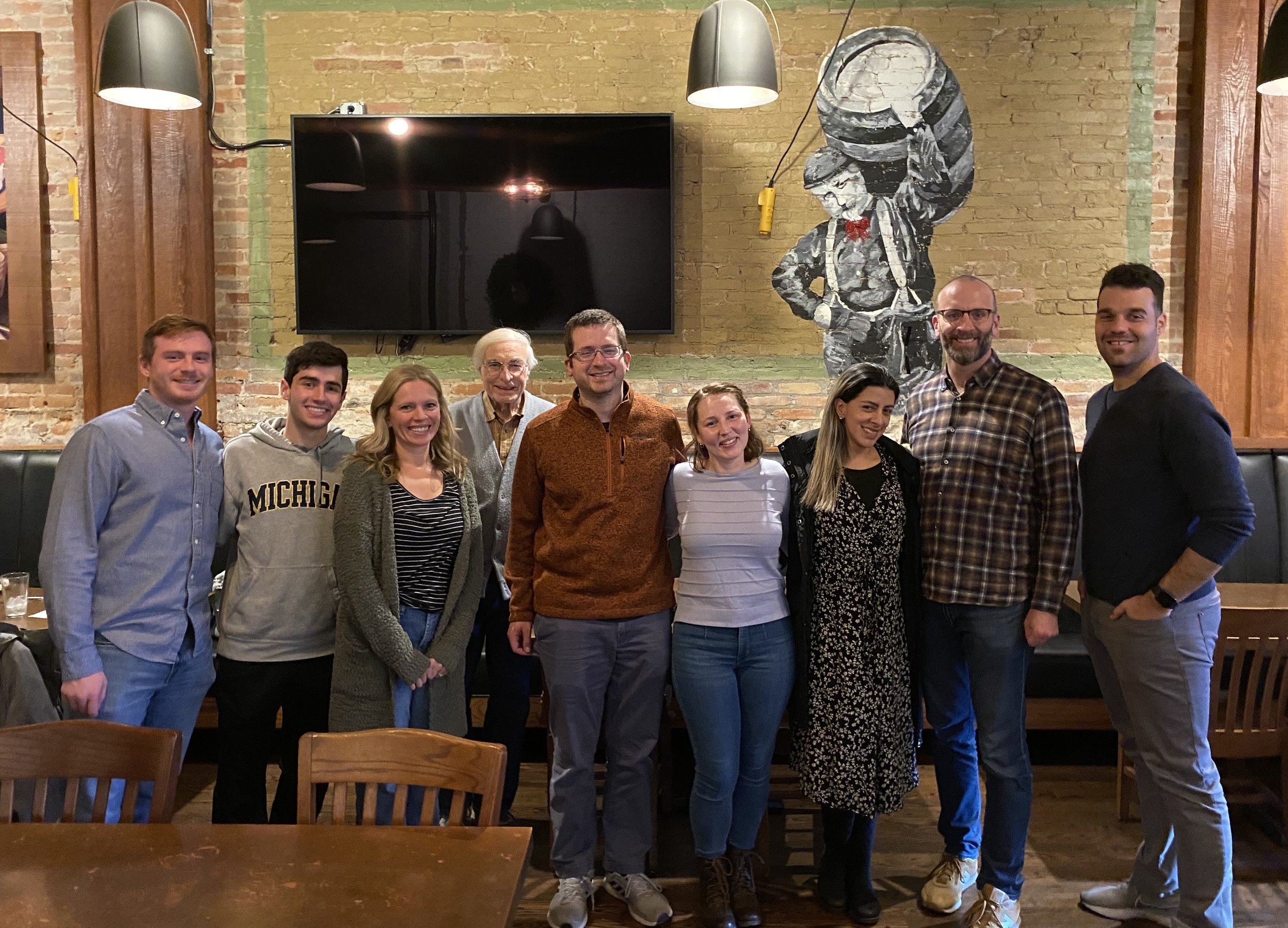Robert Dickson was part of a large team of experts who have developed and published the first definition of Immunocompromised Host Pneumonia (just published in Annals ATS).
Huge congrats to Reid McCallister, who just learned he’ll be performing his internship and residency (Internal Medicine) at the University of Colorado. Reid will receive superb clinical training, and will have loads of options to continue his research into the biology and clinical management of critical illness. Way to go, Reid!
Reid McCallister
Robert Dickson will be speaking on the topic of latent tuberculosis infections at the State of Michigan’s “World TB Day Conference” on March 24. The event will be held at the Hilton Garden Inn in Lansing.
Kale Bongers, along with Robert Dickson and Kathleen Stringer, just published a new editorial in the European Respiratory Journal on the role of the gut microbiome in ARDS. They discuss an exciting recent new study in ERJ by Wang et al: Gut microbiota-derived succinate aggravates acute lung injury after intestinal ischaemia/reperfusion in mice.
They discuss the various mechanisms by which gut bacteria may protect from - and promote - the pathogenesis of lung injury in critical illness. Congrats Kale!
Robert Dickson will be speaking at the annual conference of the Society of Critical Care Medicine in San Francisco at 11:00 on Saturday, January 21. He will speak on the topic of the microbiome’s role in ARDS.
Robert Dickson will be delivering a keynote address at the 2023 Microbiome Symposium at the University of Alabama at Birmingham on January 11. His talk will be titled “The gut and lung microbiome in critical illness.”
One of Robert Dickson’s roles is serving as Program Director of the Pulmonary & Critical Care Division’s T32 Training Program: Multidisciplinary Training Program in Lung Disease (T32HL007749). He and his T32 team recently received a perfect score (10!) on their renewal application. To celebrate, he brewed a T32-Hearted Ale, modeled (both in its brewing and label design) on Michigan’s own Bell’s Two-Hearted Ale, the best beer in America. The beer was distributed at the Division’s holiday party.
We celebrated the upcoming holidays, as well as Gisell’s return to Colombia. Cheers!
The lab had numerous reasons to celebrate (Rishi’s paper getting published on line, Jenn’s Novy award, Gisell joining us, Kale submitting his K08, Joe’s first publication, Katie passing Checkpoint 2, Piyush’s big news), so we got together this week to enjoy the beautiful Ann Arbor fall.
Out today in the European Respiratory Journal: our lab’s newest study looking at the role of the microbiome in critical illness. Our team, led by Rishi Chanderraj, studied the effects of anti-anaerobic antibiotics (which deplete the gut of protective bacteria) on clinical outcomes. In a cohort of >3,000 mechanically ventilated patients, early exposure to anti-anaerobic antibiotics was associated with a 7% absolute increased in 30-day mortality. This effect persisted when controlled for potential confounders, and we recapitulated it in two mouse models (both infectious and non-infectious).
The gut microbiome is an organ. When we devastate it with anti-anaerobic antibiotics, we induce organ failure. This has consequences in our patient’s immunity, metabolism, and susceptibility to infections. We are worried that this common clinical practice is hurting our patients.
Huge congratulations to Rishi and the rest of the team!
Rishi Chanderraj
The American Thoracic Society has again agreed to host “A Hands-On Introduction to Studying the Lung Microbiome,” a recurring one-day Post-Graduate Course chaired by Robert Dickson along with Alexa Pragman and Leo Segal.
The course will be held in Washington D.C. on Saturday, May 20, one day before the start of the 2023 American Thoracic Society International Conference.
Topics covered will include:
An introduction to thinking about the microbiome
Contaminomics
Integrating microbiome findings with our disease models
Longitudinal microbiome studies
Studying viruses and fungi in lung microbiome studies
A hands-on introduction to microbiome analysis
Microbial-host interactions
Metagenomics and metatranscriptomics
Analytics for integrative microbiome studies
Integrative, therapeutic, and environmental applications in microbiome studies
Additional details (speakers, registration information) will follow.
Katie Winner successfully passed her graduate program’s Checkpoint 2, in which she proposed and defended the research that will ultimately form her dissertation. Congrats, Katie!
Katie Winner
Jenn Baker shared her work on this week at the GRC Biology of Acute Respiratory Infection conference in Ventura, California. She shared exciting translational data exploring how depletion of gut anaerobes does (and doesn’t) alter susceptibility to pneumonia. Manuscript out soon!
Robert Dickson and an all-star team of lung microbiome investigators have published a Perspective in the American Journal of Respiratory and Critical Care Medicine on “Therapeutic Targeting of the Respiratory Microbiome.”
“Across the spectrum of acute and chronic respiratory disease, respiratory microbiota are detectable, viable, and variable across patients (2–5); correlated with disease status and severity (1); associated with airway and alveolar inflammation (5, 6); metabolically active and immunologically consequential (7, 8); predictive of clinical outcomes (9–11); influenced by environment and geography (6, 12); and causally involved in disease pathogenesis in animal models (11, 13).
Given these insights, we believe it is prudent to consider the respiratory microbiome as an unexploited, understudied therapeutic target: a biologically potent element of respiratory homeostasis, variable across patients, that may be more readily modifiable than other sources of patient heterogeneity, such as host genomes or comorbidities. In this Perspective, we delineate the anticipated opportunities and challenges related to clinically modulating the respiratory microbiome, which refers to the communities of microbes within the human respiratory tract and their associated ecological milieu.”
Manuscript (American Journal of Respiratory & Critical Care Medicine)
Jezreel Pantaleón García
For several years, Robert Dickson has been working with medical student Jezreel Pantaleón García and his mentor Scott Evans (both at MD Anderson) to study the effects of immune modulation on lung microbiota. Last year, this team published the observation that augmenting lung immune tone (via an inhaled agonist of TLR2, TLR6, and TLR9) has no appreciable effect on the lung bacteria of healthy mice. This study suggests that the known correlation between lung microbiota and lung immunity is more likely due to the host responding to dynamic changes in lung microbiota (rather than vice versa).
As a follow-up to that work, and as a service to all of us who study respiratory microbiota in mice, Jezreel led the way in a newly published letter: “Minimizing caging effects in murine lung microbiome studies.” We know that mice that are cohoused together converge in their respiratory and gut microbiota, which can result in false clustering due to “batch effects” from cohousing. If you house your mice by intervention, you’ll inevitably find differences in their microbiota, but you won’t know if it’s due to your intervention or the fact that cohoused mice cluster together.
To tackle this problem, Jezreel proposes a thoughtful and coherent solution: stratified random cohousing. “In stratified random strategies, originally cohoused mice are randomly distributed for caging with mice from all experimental groups. Then, additional stratified randomization to new cages is performed following each intervention.”
Failure to consider batch effects due to cohousing is a recurring limitation of murine microbiome studies. We hope this simple (and free) strategy will be of use to the field.
Jenn Baker has been awarded the inaugural Novy Scholarship by the University of Michigan’s Department of Microbiology & Immunology! This new award given to M&I PhD students studying bacteriology, and honors the memory of Frederick George Novy.
Congratulations, Jenn!
Katie Winner has been selected to join the Molecular Mechanisms in Microbial Pathogenesis (MMMP) T32 Training Program. The MMMP Training Grant has a strong tradition of supporting pre-doctoral and post-doctoral trainees with an interest in microbial pathogenesis, and is directed by Professors Vern Carruthers (Director) and Adam Lauring (Associate Director).
Congrats, Katie!
Katie Winner
Jenn Baker
Graduate student Jenn Baker’s abstract was selected for an oral presentation at the 2022 Gordon Research Seminar (September 10-11, Ventura Beach Marriott, California). Congrats, Jenn!
Gordon Research Seminar: Host-Pathogen Interactions During Pulmonary Health and Disease
Gordon Research Conference: Biology of Acute Respiratory Infection
Our team, led by Piyush Ranjan (lab bioinformaticist), has a new publication in Bioinformatics introducing SNIKT, a new software package we developed that automatically visualizes and removes adapter contamination from sequencing data. Adapters are short sequences added to nucleotide sequences to facilitate barcoding and sequencing. They are easily removed if you already know the adapter sequence, but this is often not the case with publicly available datasets. Our tool lets you quickly and effectively remove adapter contamination even if you don’t know the adapter sequence, and is platform-agnostic (works both on Illumina short reads and nanopore-derived long reads).
“SNIKT” stands for Slicing Nucleotides Into Klassifiable Tequences. “SNIKT” is the sound that Wolverine’s claws make when they emerge (we are Wolverines, after all). The “K” and “T” are loving winks to the error rate of nanopore sequencing.
SNIKT: sequence-independent adapter identification and removal in long-read shotgun sequencing data
Piyush Ranjan
Robert Dickson and his collaborators Hakam Tiba and Kathleen Stringer have been awarded a grant via the 2022 Massey TBI Grand Challenge. They will use a swine model of traumatic brain injury and experimental microbiome modulation to determine if and how gut bacteria can contribute to and protect from severe traumatic brain injury.




















